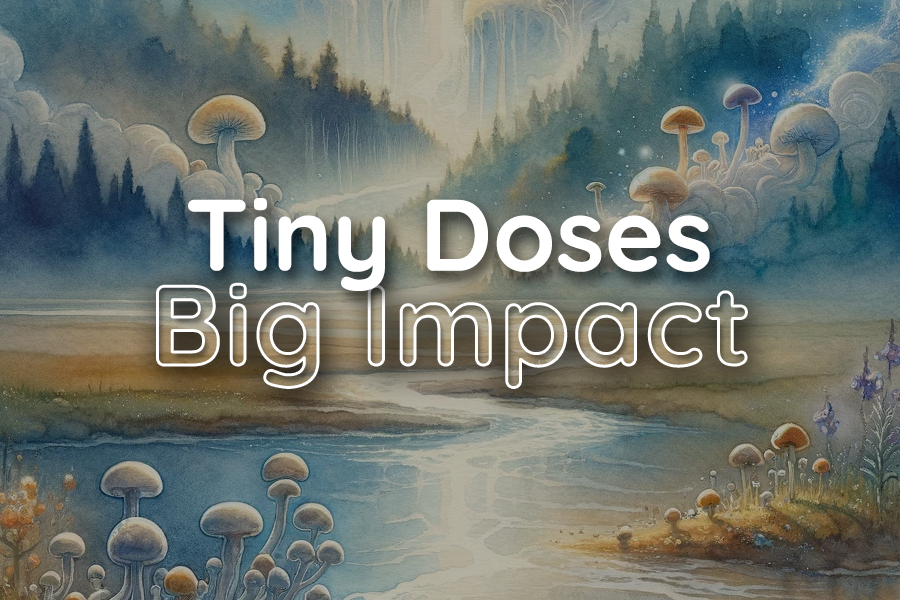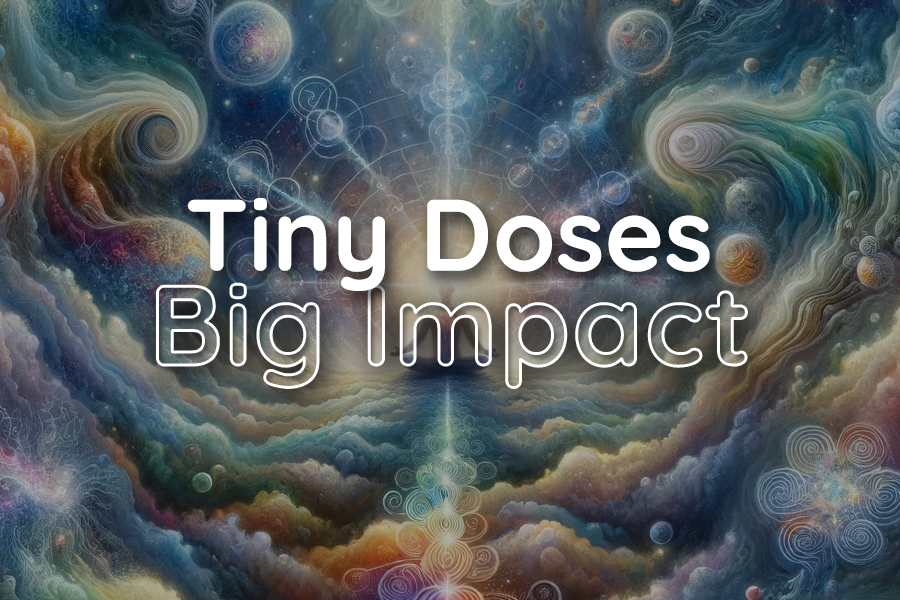The concept of microdosing has emerged as a fascinating and unconventional practice. Microdosing, the act of consuming minute quantities of psychedelic substances, has piqued the interest of researchers, healthcare professionals, and individuals seeking alternative methods to enhance their well-being. While the idea may seem counterintuitive, an increasing body of research suggests that these tiny doses, far below the threshold for a full psychedelic experience, could potentially yield significant benefits. From boosting creativity and focus to alleviating symptoms of mental health conditions, microdosing is a captivating topic that warrants further exploration.
Unlocking the Secrets of Microdosing
Microdosing involves ingesting minuscule amounts of psychedelic compounds, typically around one-tenth to one-twentieth of a standard recreational dose. These substances can range from psilocybin (found in magic mushrooms) to LSD, mescaline, and DMT. The goal of microdosing is not to induce a psychedelic “trip” but rather to experience subtle shifts in perception, mood, and cognition.
Potential microdosing benefits

Creativity and Focus
One of the most commonly reported benefits of microdosing is an enhancement in creative thinking and improved focus. Many claim that these tiny doses help them tap into their creative reserves, generating fresh ideas and perspectives while maintaining heightened concentration.
Microdosing for anxiety and Mental Health
Preliminary research suggests that microdosing may have positive implications for mental health conditions such as depression, anxiety, and post-traumatic stress disorder (PTSD). Some individuals report experiencing reduced symptoms, increased emotional stability, and overall well-being.
Neuroplasticity and Cognitive Function
Microdosing Psychedelics are known to stimulate neuroplasticity, the brain’s ability to reorganize and form new neural connections. Microdosing may potentially facilitate this process, leading to improvements in cognitive function, learning, and memory.
The Science Behind Microdosing
While microdosing is still relatively new and understudied, researchers are eagerly exploring the mechanisms behind its potential benefits. One hypothesis suggests that Microdosing Psychedelics may influence the brain’s serotonin system, which plays a crucial role in regulating mood, perception, and cognition. Additionally, some studies have indicated that microdosing can increase brain-derived neurotrophic factor (BDNF) levels, a protein associated with neuronal growth and plasticity. This increased neuroplasticity may contribute to the reported cognitive enhancements and therapeutic effects.
Challenges and Considerations
Despite the growing interest in microdosing, several challenges and considerations must be considered. The legal status of psychedelics varies globally, with most countries classifying them as controlled substances. Furthermore, the long-term effects of microdosing are not yet fully understood, and more research is needed to establish its safety and efficacy.
It is also essential to note that microdosing is not a one-size-fits-all solution, and individuals may experience varying responses. Some individuals may be more sensitive to the effects of psychedelics, while others may not experience any noticeable benefits.
Conclusion
The practice of microdosing remains a fascinating and controversial topic in the realm of personal growth and well-being. While the potential benefits are intriguing, it is crucial to approach microdosing cautiously and seek guidance from qualified professionals. As research continues to shed light on this unconventional practice, it is essential to maintain an open yet critical mindset, weighing the potential risks and benefits carefully. Ultimately, the decision to microdose should be informed based on a thorough understanding of the available information and personal circumstances.
FAQs
Are there any side effects associated with microdosing?
While microdosing is generally considered safe when done responsibly, some individuals may experience mild side effects such as headaches, nausea, or changes in perception. It’s important to start with very low doses and monitor your body’s response.
Can microdosing be addictive?
There is currently no evidence to suggest that microdosing itself is addictive.
How often should one microdose?
There is no definitive schedule for microdosing, as it depends on individual factors and desired effects. Many practitioners recommend following a cyclic pattern, such as microdosing every three or four days, with breaks in between.
Can microdosing interact with medications?
Yes, there is a possibility of interactions between psychedelics and certain medications, particularly those that affect the serotonin system. It’s crucial to consult with a healthcare professional before attempting microdosing if you are taking any prescribed medications.
Can microdosing help with specific mental health conditions?
While some individuals report improvements in conditions like depression, anxiety, and PTSD, the research on microdosing for specific mental health conditions is still limited. More studies are needed to establish its efficacy and potential therapeutic applications.
What are the potential benefits of micro dosing Canada?
Canadians interested in mental health and personal growth might be drawn to micro dosing’s potential to:
Reduce symptoms of anxiety and depression
Enhance focus and creativity
Boost overall well-being and mood






